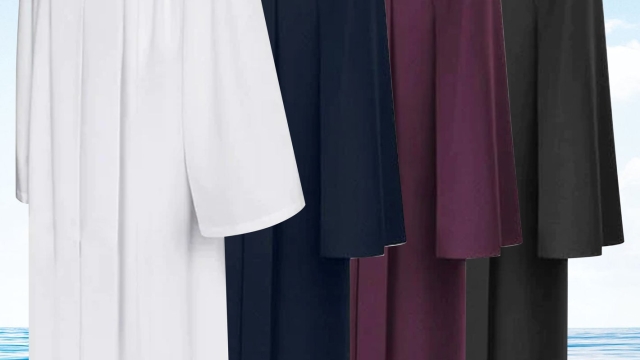
In the sacred act of baptism, pastors play a pivotal role as the conduits for spiritual transformation. As they guide individuals through the waters of rebirth, their attire holds significant symbolism, embodying both tradition and reverence. Baptism robes for pastors, often referred to as pastor baptism robes or pastor baptismal robes, serve as tangible representations of their faith and commitment to their calling. These garments not only clothe the body but also cloak the wearer in a mantle of spiritual authority, underscoring the sacred nature of the ritual.
Symbolism of Baptism Robes
When it comes to baptism robes for pastors, the choice of garment holds deep symbolic significance. The white color commonly used in pastor baptism robes represents purity and the cleansing of sins through the act of baptism. This visual symbol serves as a reminder of the spiritual rebirth that one experiences during the sacrament of baptism, marking a new beginning in faith and a commitment to living a righteous life.
In addition to the color white, the design elements of pastor baptismal robes often incorporate symbols such as crosses or doves. These symbols carry profound meaning within Christian tradition, with the cross representing the sacrificial love of Jesus Christ and the dove symbolizing the presence of the Holy Spirit. When a pastor wears a robe adorned with these symbols during a baptism ceremony, it not only enriches the aesthetic appeal but also reinforces the theological significance of the event.
Beyond the visual symbols, the act of putting on a baptism robe can be seen as an outward expression of inner transformation. By donning the garment before leading a baptism service, a pastor publicly acknowledges their role as a spiritual guide and servant of God. The robe becomes a uniform of authority and humility, signifying the sacred responsibility entrusted to the pastor in facilitating the baptismal process and nurturing the newly baptized individual in their faith journey.
History of Pastor Baptism Robes
In the early Christian church, baptism robes for pastors held great significance as symbols of purity and new beginnings. These simple white garments were worn during the baptism ceremony to represent the washing away of sins and the emergence of a new life in Christ.
Youth Baptism Robes
Over the centuries, pastor baptism robes evolved in style and design, reflecting the cultural influences of different regions and the artistic preferences of various religious denominations. While white remained the predominant color symbolizing purity, variations in fabric, decoration, and ceremonial accessories emerged to add layers of meaning to the attire.
Today, pastor baptismal robes continue to be an integral part of the baptismal ritual in many Christian traditions. Whether tailored in traditional styles or modern interpretations, these robes serve as a visual reminder of the sacred nature of baptism and the spiritual calling of those who officiate the sacrament.
Significance in Religious Ceremonies
Baptism robes for pastors hold a deep significance in religious ceremonies. These robes symbolize the purity and commitment to faith that both the individual being baptized and the pastor leading the ceremony uphold. By donning these robes, pastors embody a sense of reverence and spiritual authority, guiding the congregation through the sacred ritual of baptism.
The white hue of pastor baptism robes represents the purity and cleansing of sins through the act of baptism. This color choice reflects the spiritual rebirth and renewal that the baptized individual experiences, as well as the journey towards a life dedicated to the teachings of the faith. The simplicity and elegance of these robes further emphasize the solemnity and sanctity of the baptismal ceremony.
Additionally, pastor baptismal robes serve as a visual representation of the pastor’s role as a spiritual shepherd within the church community. The act of baptizing individuals is a sacred duty that pastors undertake with humility and devotion, and the symbolic attire of the baptism robe underscores the importance of this role. Through these robes, pastors are not only leading the ceremony but also connecting with the congregation on a spiritual level, fostering a sense of unity and faith among all participants.
